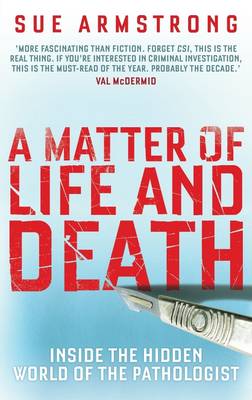
EURO CRIME
Reviews

Armstrong, Sue - 'A Matter of Life and Death'
Paperback: 384 pages (Apr. 2010) Publisher: Canongate Books Ltd ISBN: 1847675816
This book is a fascinating set of interviews with real-life pathologists, working in different cities across the globe and talking about their experiences in the murky world of death, disease and scientific research. It's an extremely interesting read and the difference in the working conditions in the different countries - South Africa and the UK, for example - is mind blowing. What really shines through on every page, though, is the passion that these amazing people have for their work and their sheer determination to do their utmost to solve the crime or diagnose the disease, to give closure to grieving families and to teach the next generation of pathologists everything they know.
The people chosen for interview come from varied backgrounds and upbringings - some rich and privileged, others from extremely poor families that struggled to pay their tuition fees. They also work in different fields within pathology and their stories fit together to make for an absorbing foray into the less than glamorous world behind the scenes of the public face of medicine.
Take, for example, Bill Bass, the American forensic anthropologist who has a body farm out in Tennessee. In order to establish how bodies decay and how long it takes, he has a plot of land where he leaves bodies to decay in different situations and reports on how things happen. Interestingly, his work is so popular that he has people bequeathing their bodies to him to further his cause.
Or Irene Scheimberg, the young woman who had to flee from Argentina in fear of her life as her friends 'disappeared' and finished her medical studies alone in a foreign country. She has gone on to become a consultant paediatric and perinatal pathologist in The Barts and London hospital, and carries out postmortems on very young babies, or stillborn fetuses, to establish the cause of death.
Or there is Sue Black, the bone specialist from the University of Dundee, or James Ironside, from The University of Edinburgh, who conducted the pioneering work into CJD, or Patricia Klepp, who works in harrowing conditions as a forensic pathologist in Johannesburg; one of the most violent cities in the world.
All of the individual interviews make you think about life - and death - and how fleeting our fragile existence here on earth actually is. I highly recommend this book, although it most certainly isn't an easy read or light entertainment. One of the most informative books I have read for a long time.
Amanda C M Gillies, Scotland
September 2010
More reviews can be found on the Reviews page.